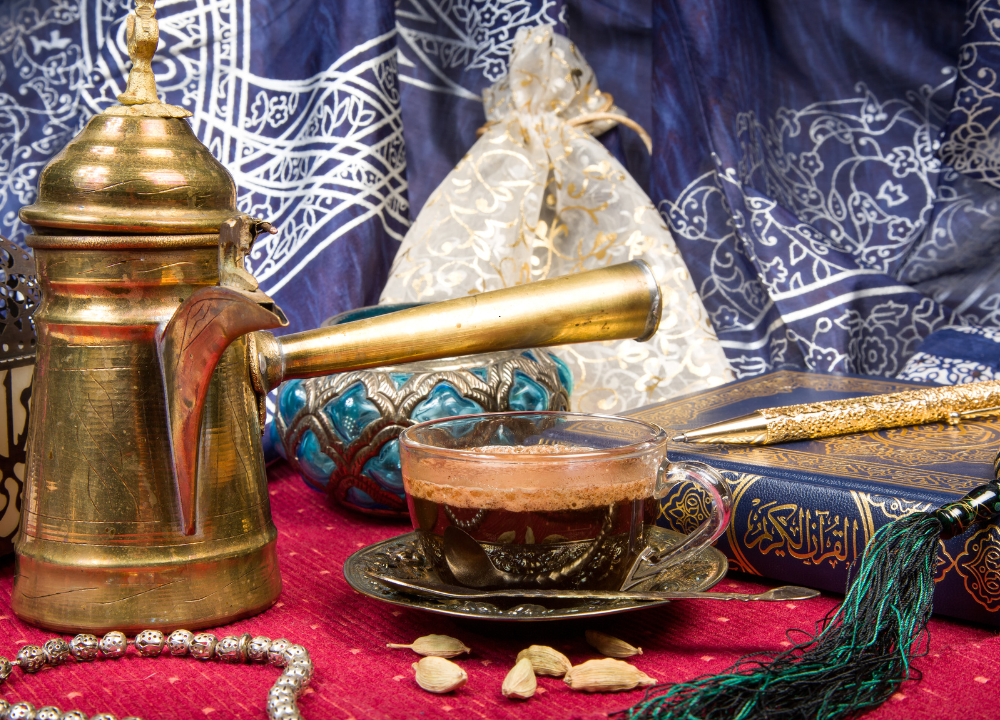This traditional beverage reflects the warmth and hospitality of Emirati people. In the heart of Arab culture, coffee plays a vital role in daily life. Emirati coffee, known as “qahwa,” has a rich history that dates back centuries.
Introduction To Emirati Coffee
The rich history and unique traditions surrounding Emirati coffee make it a vital part of Emirati hospitality.
What Is Emirati Coffee?
Emirati coffee, or Gahwa, is a traditional Arabic coffee made from lightly roasted beans. It is often flavored with cardamom and sometimes saffron. This coffee is usually served in small cups. It is a symbol of generosity and hospitality in Emirati culture.
The preparation of Gahwa involves a few key steps:
- Roasting the coffee beans until golden brown.
- Grinding the beans to a coarse texture.
- Boiling water and adding the ground coffee and spices.
- Simmering the mixture for a few minutes.
- Straining and serving in small cups.
Gahwa has a unique taste profile:
- Flavor: Mild and aromatic.
- Aroma: Fragrant, with hints of cardamom.
- Color: Light golden hue.
Gahwa is not just about taste. It is a part of rituals. Serving coffee shows respect and hospitality. Guests often enjoy a cup before or after meals. It brings people together, creating bonds and conversations.
The History Of Coffee In The Uae
Coffee in the UAE tells a story of connection, hospitality, and heritage. The roots of this beverage stretch deep into the past, tracing back to ancient times.
The Origins Of Coffee In The Arabian Peninsula
Coffee has a long and fascinating history in the Arabian Peninsula. It is believed that coffee first originated in Ethiopia. From there, it spread to the Arabian Peninsula in the 15th century. The drink quickly gained popularity for its stimulating effects. Here are some key points about coffee’s origins:
- Coffee is thought to have been discovered by a goat herder named Kaldi.
- The use of coffee began in Sufi religious ceremonies.
- By the 16th century, coffee houses, known as qahveh khaneh, became popular in the Middle East.
These coffee houses served as social gathering places. People would meet to discuss politics, literature, and community matters. The cultural importance of coffee grew with time.
| Year | Event |
|---|---|
| 15th Century | Coffee spreads to the Arabian Peninsula. |
| 16th Century | Coffee houses become popular in the Middle East. |
| 17th Century | Coffee reaches Europe. |
The Journey Of Coffee To The Emirates
The journey of coffee to the UAE is an essential part of its history. In the 18th century, coffee became a staple in Emirati culture. Trade routes brought coffee from Yemen to the UAE. As a result, coffee became a symbol of hospitality.
Emirati coffee, known as “qahwa,” is different from other types. It is often prepared with cardamom, giving it a unique flavor. This drink is served in small cups. Here are some traditions related to Emirati coffee:
- Serving qahwa is a sign of respect and hospitality.
- It is often accompanied by dates, enhancing the experience.
- Guests are served in a specific order, usually starting with the most honored guest.
Today, coffee is an important part of Emirati social life. It is enjoyed in homes, cafes, and during special occasions. The rich history of coffee reflects the warmth and generosity of Emirati culture.
Traditional Coffee Practices In Emirati Culture
Traditional coffee practices in Emirati culture highlight respect and connection among people. Coffee rituals create bonds and show generosity. These practices continue to thrive, reflecting the heritage of the UAE.
The Emirati Dallah: A Symbol Of Tradition
The dallah is an iconic coffee pot in Emirati culture. Its unique shape and design make it easily recognizable. The dallah is usually made of brass or stainless steel, polished to shine brightly. This pot holds a special place during gatherings.
Key features of the dallah include:
- Shape: The dallah has a long spout and a curved handle.
- Decoration: Many dallahs are adorned with intricate patterns.
- Size: They come in various sizes, catering to different gatherings.
The dallah is not just for brewing coffee. It represents Emirati identity and values. During special occasions, families display their finest dallah. It is a symbol of hospitality.
| Feature | Details |
|---|---|
| Material | Brass, stainless steel |
| Use | Brewing and serving coffee |
| Significance | Symbol of hospitality |
Serving Coffee: Customs And Etiquette
Serving coffee in Emirati culture follows specific customs. These customs show respect and warmth. The host pours coffee from the dallah into small cups called finjaan. It is essential to hold the dallah with the right hand. This gesture shows honor.
Key customs when serving coffee include:
- Offer with the right hand: Always serve with the right hand.
- Fill only a quarter: Pour only a small amount in each cup.
- Accepting coffee: Guests should receive the cup with their right hand.
Guests should drink the coffee in small sips. If they do not want more, they shake the cup gently. This signals they are finished. The host will understand and respect this gesture.
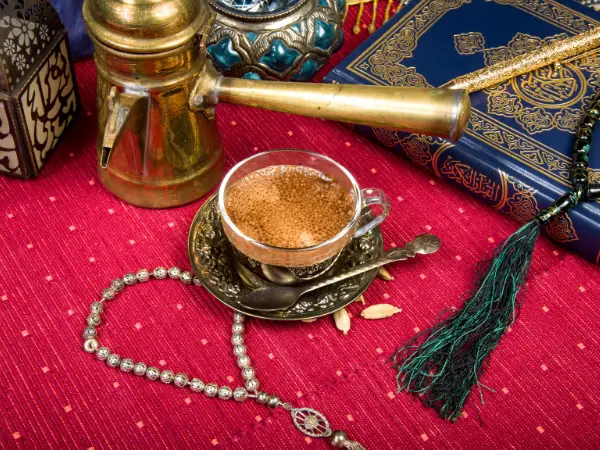
The Cultural Significance Of Coffee In The Uae
Coffee is an essential part of Emirati life. It symbolizes warmth, hospitality, and friendship. Sharing coffee is a way to connect with others and show respect.
Coffee And Emirati Hospitality
Emirati hospitality is world-renowned, and coffee plays a central role. The act of serving coffee is a gesture of respect and friendship. Guests are welcomed with a cup of coffee as a sign of generosity. This tradition reflects the values of the Emirati people.
- Serving Style: Coffee is often served in small cups, allowing guests to enjoy multiple servings.
- Dates: Dates are typically offered alongside coffee, enhancing the experience.
- Pouring Ritual: The host pours coffee from a traditional pot called a “dallah.” This adds a special touch to the service.
Emirati coffee is often prepared with cardamom, giving it a unique flavor. The preparation itself is a cherished ritual. It brings family and friends together.
| Element | Significance |
|---|---|
| Dates | Symbol of hospitality and sweetness |
| Dallah | Represents tradition and skill in serving coffee |
| Small Cups | Encourages multiple servings and conversation |
Overall, coffee is a vital part of Emirati hospitality. It strengthens bonds and creates lasting memories.
The Role Of Coffee In Social Gatherings And Ceremonies
In the UAE, coffee is central to social gatherings and ceremonies. It marks celebrations and important events. Whether at weddings, festivals, or family gatherings, coffee is always present.
- Weddings: Coffee is served to guests as part of the celebratory atmosphere.
- Festivals: During Eid, families serve coffee to visitors as a symbol of goodwill.
- Business Meetings: Offering coffee is a way to build rapport and trust.
During gatherings, the host often engages in conversation while pouring coffee. This creates a warm and welcoming environment. Guests feel valued and appreciated.
Many Emiratis have learned the art of coffee making from their parents. This skill is passed down through generations. It is a source of pride for many families.
| Event | Coffee’s Role |
|---|---|
| Weddings | Celebrates the union of families |
| Eid Celebrations | Symbolizes sharing and community |
| Business Meetings | Facilitates networking and relationship building |
Coffee is more than a beverage in the UAE. It is a tradition that connects people and enhances relationships.
Modern Coffee Trends In The Uae
As modern coffee trends emerge, this cultural staple adapts to new tastes and styles. Specialty coffee shops are thriving. They blend Emirati heritage with contemporary coffee culture.
Specialty Coffee Shops And Their Growing Popularity
Specialty coffee shops in the UAE have seen a surge in popularity. These shops focus on high-quality beans and unique brewing methods. They attract a diverse crowd, from locals to tourists. Here are some reasons for their growing appeal:
- Quality Over Quantity: Customers seek rich flavors and unique blends.
- Artisan Brewing: Many shops use traditional methods combined with modern techniques.
- Community Vibe: These places often serve as social hubs.
Some popular specialty coffee shops include:
| Shop Name | Location | Specialty |
|---|---|---|
| Arabian Tea House | Dubai | Traditional Arabic Coffee |
| One Life Kitchen and Café | Dubai | Gourmet Coffee |
| Espresso Lab | Dubai | Artisan Espresso |
These shops offer unique experiences. They showcase coffee as an art form. Customers enjoy not just drinks but also the atmosphere. The growing demand for specialty coffee reflects a broader trend in the UAE. People are more aware of quality and flavor. This trend is likely to continue as coffee culture evolves.
Blending Tradition With Modern Coffee Culture
The UAE’s coffee scene merges traditional Emirati coffee with modern trends. Traditional coffee, known as Gahwa, is often flavored with cardamom and served in small cups. It remains a symbol of hospitality. Modern coffee culture introduces new flavors and brewing styles.
Many coffee shops honor tradition while embracing innovation. They serve Gahwa alongside specialty lattes and cold brews. This blend attracts a wide range of customers.
- Traditional Elements: Shops often include Arabic decor and serve coffee with dates.
- Modern Touches: New brewing techniques like pour-over and siphon are popular.
Events like coffee festivals celebrate both traditions and modern trends. These festivals feature:
- Barista competitions
- Tastings of different coffee blends
- Workshops on brewing techniques
This blending of old and new creates a unique coffee culture. It allows Emirati coffee to thrive in a modern world. Coffee lovers appreciate the depth of flavors and the stories behind each cup.
Traditional Emirati Coffee Recipe
The traditional Emirati coffee recipe reflects the rich history and values of the people. This coffee, known as “Qahwa,” is often served during gatherings, celebrations, and special occasions.
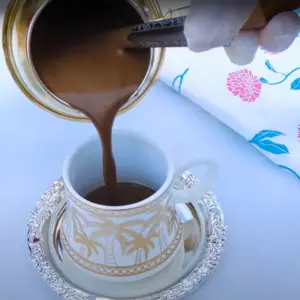
How to Make Emirati Coffee
Equipment
- A dallah (Arabic coffee pot) Or small saucepan or any stovetop coffee pot
- Arabic coffee cups Or espresso cups or small teacups
Ingredients
- 500 ml Water
- ½ cup Finely ground Emirati coffee beans or Any lightly roasted coffee
- ½ teaspoon Cardamom
- ¼ teaspoon Clove
- A small pinch of saffron
Instructions
- Before brewing your Emirati coffee, gather all necessary ingredients. Here’s what you need:Green Coffee Beans: 1 cupWater: 4 cupsCardamom Pods: 4-6 podsSaffron Strands: a pinch (optional)Dates: for serving (optional)Next, prepare the coffee beans. Traditionally, Emirati coffee uses lightly roasted green beans. Follow these steps:Rinse the beans: Place the green coffee beans in a bowl. Rinse them under cold water. This removes dirt and impurities.Dry the beans: Spread the rinsed beans on a clean cloth. Allow them to dry for a few minutes.Grind the beans: Use a coffee grinder. Grind the beans coarsely. The grind size affects the flavor.Now you are ready to brew. Gather your ingredients and equipment to make the perfect cup of Emirati coffee.

- Brewing Emirati coffee is simple but requires attention to detail. Follow these steps to brew your Gahwa:Use a Dallah: This traditional pot enhances the flavor.Measure water: Pour 4 cups of water into the Dallah.Next, add the ground coffee:Add 1 cup of the coarsely ground coffee to the water.Place the Dallah on low heat. Allow it to simmer gently.While the coffee simmers, prepare the cardamom:Crush the cardamom pods slightly. This releases their flavor.Add the crushed cardamom to the Dallah after 5 minutes.Let the coffee simmer for another 10-15 minutes. This allows the flavors to blend. Once brewed, remove the Dallah from heat. Your coffee is ready for the final touches.
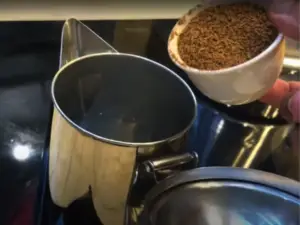
- Final touches elevate your Emirati coffee. Saffron and cardamom add depth and aroma:Add Saffron: After removing the Dallah from heat, add a pinch of saffron. Stir gently.Serve hot: Pour the coffee into small cups.Enjoy the coffee with dates. They complement the drink perfectly. Here’s how to serve:Place a small bowl of dates next to each cup.Offer the coffee to guests first. This shows hospitality.The combination of saffron and cardamom enhances the flavor. Your Emirati coffee is now ready. Enjoy it with family and friends, and embrace the warmth of Emirati traditions.
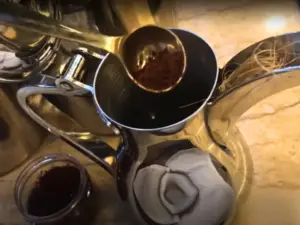
Serving Tradition
In Emirati culture, serving coffee is an art. The host pours coffee into small cups. It is polite to fill only a little. Guests can signal if they want more by raising their cup. This shows respect and appreciation.
Enjoying Emirati coffee is not just about taste. It is about sharing moments and stories. This beverage brings people together. It connects generations and strengthens bonds.

